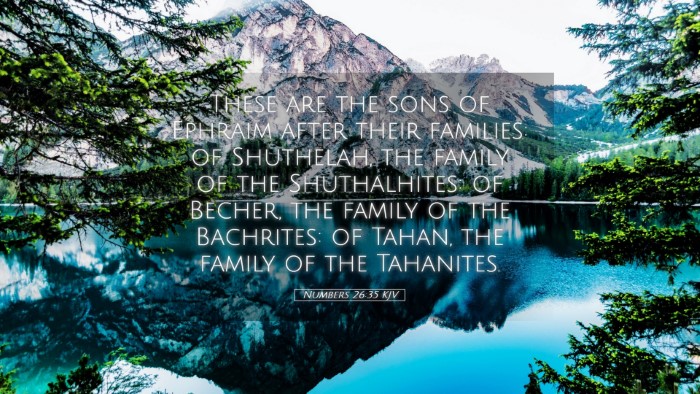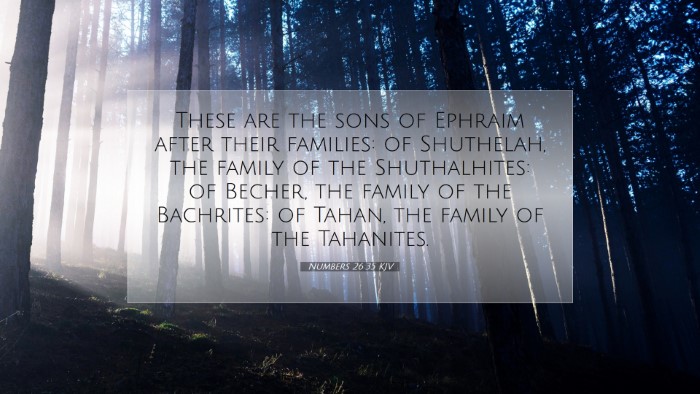Commentary on Numbers 26:35
Numbers 26:35 reads: “These are the sons of Ephraim after their families: of Shuthelah, the family of the Shuthelahites: of Becher, the family of the Becherites: of Tahan, the family of the Tahanites.” This verse is part of a larger enumeration of the tribes of Israel, providing insight into the lineage and families within the tribe of Ephraim. Below, we explore the implications and meanings of this passage through the insights of noted biblical commentators.
Context and Significance
This verse occurs during the second census of the Israelites as they prepare to enter the Promised Land. The chapter reflects God's faithfulness to His promises, as stated in the previous census (Numbers 1) and highlights the importance of lineage in Israel’s tribal structure. The genealogy mentioned not only establishes identity but also portrays the fulfillment of God’s covenant.
Insights from Matthew Henry
Matthew Henry notes that this genealogical record serves several purposes:
- Preservation of Heritage: The enumeration of families emphasizes the significance of heritage and the continuity of the Israelite community.
- Divine Order: God’s ordering of the families illustrates the structured approach to governance and relationship among the tribes of Israel.
- Fulfillment of Promises: The growth and establishment of Ephraim's lineage is a testament to God's promises to Abraham, Isaac, and Jacob, reflecting on how God’s covenant loyalty ensures the perpetuation of family lines.
Insights from Albert Barnes
Albert Barnes emphasizes the importance of the names provided in the census:
- Significance of Names: Each family represents not just a branch of Ephraim but carries historical and spiritual significance.
- Tribes' Responsibilities: The families listed hold distinct roles and responsibilities within the community, indicating that organization and structure are essential for cohesiveness and function.
- New Generations: The listing of these families also shows the new generations that have emerged since the Exodus, emphasizing continuity amidst change.
Insights from Adam Clarke
Adam Clarke provides further commentary on the broader implications of such genealogies:
- Historical Context: Clarke notes that the listing comes at a critical time as the Israelites are poised to inherit the land, making the records vital for understanding rights to land and resources.
- Inter-Tribal Relationships: The detail in lineage fosters an understanding of inter-tribal dynamics, vital for conflict resolution and communal integrity.
- Symbolism of Families: The families symbolize the diverse yet united nature of the people of God, each with its own story but all under a common covenant with God.
Theological Reflections
This passage, while focused on specific families, offers theological insights into God’s workings among His people:
- Covenantal Faithfulness: The careful record of each family signifies that God remembers His promises and fulfills them through generations.
- Identity in Community: The emphasis on family and lineage points to the relational nature of God's chosen people and the importance of community in spiritual journeys.
- Preparing for the Future: By documenting the families, God prepares Israel to take possession of their promised land, highlighting the providential care in their destiny.
Conclusion
Numbers 26:35, while a simple record of families, encapsulates profound truths about identity, continuity, and divine faithfulness. The insights of Matthew Henry, Albert Barnes, and Adam Clarke provide layered understanding, enriching the text's significance for both contemporary readers and scholars alike. As one reflects on this genealogical entry, it is a reminder of the enduring legacy of God's promises throughout history.


